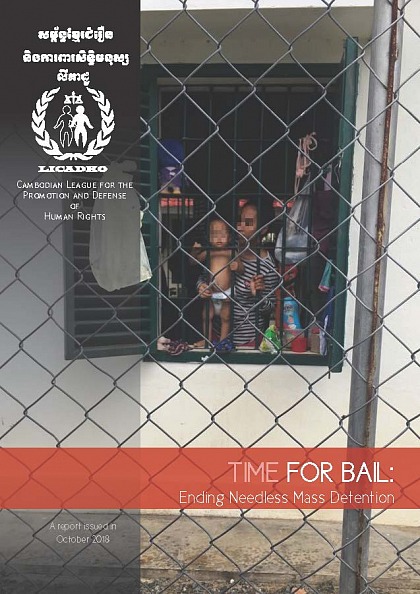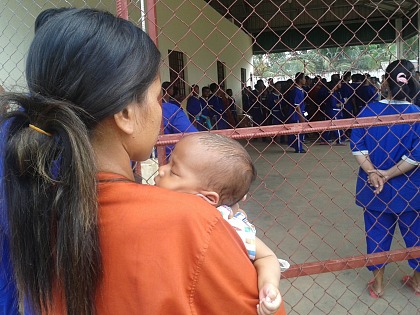Time for Bail: Ending Needless Mass Detention in Cambodia
Published on 1 November 2018Cambodia’s prison population has risen to unprecedented levels and acute overcrowding has become a major problem, affecting not only inmates but prison staff and society as a whole. Record numbers of women with children under three years of age were behind bars during the last year. Correctional Center 1, the main men’s prison in Phnom Penh, houses more than three times the number of inmates it was built to accommodate.
In a new report, Time for Bail: Ending Needless Mass Detention in Cambodia released today, LICADHO examines the role Cambodia’s courts play in contributing to this crisis and highlights how the criminal justice system could be improved by small and feasible changes.
Despite laws designed to limit pre-trial detention and respect the principle of presumption of innocence (Article 38, Constitution of the Kingdom of Cambodia; Article 203, Criminal Procedure Code), people accused of a crime, even petty offences, are rarely offered bail according to LICADHO’s research. In the 18 prisons that LICADHO monitors nationwide (out of a total of 28) more than a third of prisoners are pre-trial detainees: 9,527 out of 25,926 (LICADHO statistics, May 2018, provided by prisons). In some prisons about half the inmates have yet to face trial. A person accused of a crime can be held without trial for up to 22 months.
This has exacerbated overcrowding and stretched already thin resources. It particularly affects vulnerable groups, including infants with incarcerated mothers or babies born to pregnant detainees. There are currently about 135 mothers with 138 children under three years of age in prisons monitored by LICADHO, along with 30 pregnant women (LICADHO statistics, July 2018, provided by prisons). About half of those women are yet to be convicted. During a critical stage of child development, pregnant and breastfeeding women often receive no additional food.
“Families are being plunged into poverty and children’s lives are put at risk because of this engrained disregard for bail provisions by Cambodian courts. Apart from in exceptional cases, bail is supposed to be a right – not a privilege,” said LICADHO Director Naly Pilorge.
“But in Cambodia people accused of crimes are often treated as if they are guilty until proven innocent. Justice is not being served but it could be if the law was followed.”
Effective use of bail for minor non-violent crimes would benefit the entire criminal justice system. It would encourage the prioritisation of cases according to their severity and reduce the excessive workload of the judiciary. It would also have a positive social impact: reducing prison overcrowding, keeping families together and preventing the harm inflicted on infants growing up behind bars.
Investigating judges have the power to grant bail at any time until detainees go to trial. This power should be exercised to uphold the rights of citizens and relieve the pressure on thousands of inmates and prison officials facing appalling conditions every day in Cambodia’s underfunded prisons.
 | Download this document in English (PDF, 994.11 KBs) |
 | Download this document in Khmer (PDF, 1.11 MBs) |










